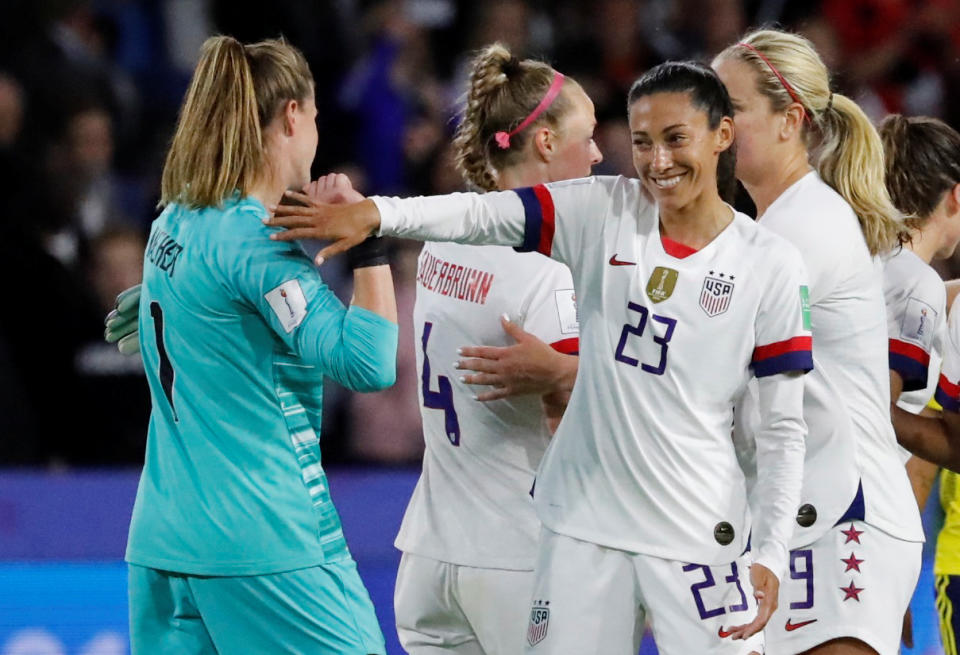USWNT made right call by playing to win against Sweden – even if it leads to France
The Americans knew exactly what they wanted to do.
Outside the team, the speculation for many weeks had been whether the United States women’s national team would be best off throwing its final Women’s World Cup group stage game against Sweden, should it determine who placed first or second in the group. After all, the winner would likely face France, the home team and one of the favorites, in the quarterfinals. The runner-up would potentially avoid Les Bleues until the final.
Sure enough, France won its group and the USA and Sweden had their places in the knockout stages sewn up after each racked up a pair of predictable victories against Thailand and Chile. But to the U.S., tanking against the Swedes, who had knocked them out of the Rio Olympics three years ago, never seemed to be a consideration.
“You can’t overthink this,” head coach Jill Ellis had said ahead of the game. “Deciding to come second or manipulate the score, that can be dangerous.”
Besides, she saw this game as the team’s biggest test of the group stage by far, and the best chance to clean up its game before the margin of error disappears in the knockout stages. “It comes down to focus,” she said. “That’s why this is going to be great for us, because we do need to sharpen that.”
So on Thursday, after all the handwringing, the Americans took an early lead when Lindsey Horan slipped through a thicket of Swedes on a corner and poked the ball into the net from the doorstep. And they got a second just after halftime, when Tobin Heath beat her defender and scored from close range on a deflection – downgrading it to an own goal. 2-0. Fine.
This intentional … victory … in a game of soccer was the right call.

It was the only real challenge in the group stage. And the Americans learned a lot. They learned that they were, on the day at least, weak on the left flank with Crystal Dunn exposed as the unnatural defender that she is and Megan Rapinoe partly culpable for her chronic lethargy in tracking back. They learned that the defensive shape isn’t quite right yet, allowing for lanes to open up in transition. They learned that Heath went long stretches without significant involvement in the first half. They learned that Alex Morgan was crowded out by physical defenders, before coming off at halftime as precaution for a slight knock.
These are valuable data points that give the team something to work toward before the games start mattering again.
Just as the positives provide useful information. The effectiveness of the high tempo, for instance. Or Sam Mewis’s continued excellence, this time slotting in for the slightly injured Julie Ertz. Horan’s dominance in the middle. Rose Lavelle’s emergence as perhaps the world’s best No. 10 of the moment. And Alyssa Naeher’s solid night in goal, after barely featuring in the first two games, making a string of strong saves that will hearten her in the face of all the questions she has parried about succeeding the all-time great Hope Solo.
But there were other reasons to play this game hard. After all, would playing Canada in the round of 16 and Germany thereafter really have been all that much better than facing Spain and then France, as the U.S. now will? The Canadians are intimately familiar with the USA and have played them close plenty of times. Germany is a contender in its own right.
At any rate, the Americans will have to beat everybody at some point in order to lift the trophy for a second World Cup in a row.
And as Ellis pointed out, it’s hard to predict how all of this shakes out. There’s little sense in attempting to play the puppetmaster over the knockout bracket, with the unpredictable looming in a single-elimination stage. Strange things will happen. Best not to try to game it.
Because there’s lots of psychological value to keeping the winning momentum going, keeping the winning spirit going. That’s this team’s ethos, after all. Winning is woven deep into its genetic wiring. And if this team even knew how to lose on purpose, there’s no telling what the upshot would be to its mindset.
“This was the ignition we needed, I think,” Ellis said after the game.
Nobody has ever lost the World Cup by winning every game.
Leander Schaerlaeckens is a Yahoo Sports soccer columnist and a sports communication lecturer at Marist College. Follow him on Twitter @LeanderAlphabet.
More from Yahoo Sports:

